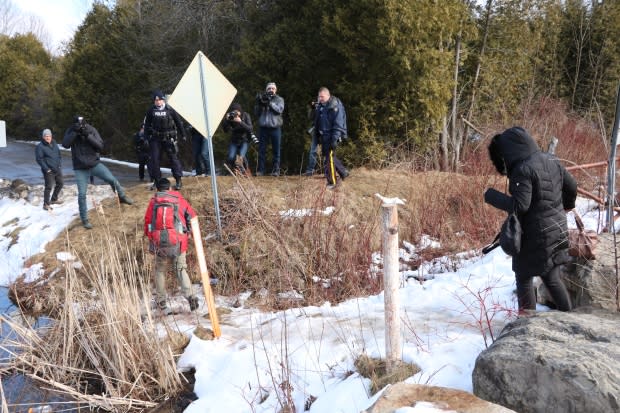Group claims police are improperly helping CBSA round up undocumented immigrants
The group No One Is Illegal - Toronto will be at this afternoon's Toronto Police Services Board meeting to push their case for a don't-ask, don't-tell policy in police dealings with undocumented immigrants.
The group says it used freedom of information legislation to compile a list of more than 3,200 times Toronto police officers called the Canadian Border Services Agency from November 2014 to June 2015.
"What we're seeing is that basically Toronto Police Services is doing Immigration (and Citizenship Canada's) job," said Macdonald Scott, an immigration consultant and No One Is Illegal - Toronto member who'll be making the group's presentation to the police board Tuesday.
"They are going out and picking up people when people don't have status; they are basically enforcing immigration warrants. They are doing the job that Canada Border Services Agency is supposed to do."

Toronto police refused an interview request Monday from CBC Toronto. But in a report for tomorrow's board meeting, deputy Deputy Chief Peter Yuen defends the police record, writing "The Service will continue to make enquiries to the CBSA for bona fide law enforcement reasons."
His report says police calls to CBSA were far fewer than No One Is Illegal's number. It said a TPS investigation found there were fewer than 700 times that the TPS contacted immigration authorities between 2014 and 2016. And all of those instances were justified.
The report found that in many cases, police had made follow-up calls on the same case, which were recorded by the CBSA as multiple incidents.
But Scott said many of the calls his group uncovered violated the spirit, if not the letter, of the city's 2013 designation as a sanctuary city.
Sanctuary City
That declaration guarantees that city staff won't ask about anyone's immigration status before providing city services, nor will they report anyone who may be here illegally.
But the group says police have only said they won't actively try to find out the immigration status of a victim, witness or suspect.
If they do happen to find out someone is here illegally however, the group claims police will often report that information to the CBSA, which can then have the individual arrested and deported.
'Don't-ask, don't-tell'
"What we want is for the police to have an actual 'don't ask,' don't-tell' policy," Scott said Monday.
He said Toronto police should not even be telling the CBSA when they're investigating an undocumented immigrant who's suspected of serious criminal acts. "I don't think they should be reporting someone . . . even if they're up to no good."
Scott said he'll be making a presentation to the board today, during which he'll also show that there is a link between police enforcement of immigration laws, and racial profiling.
"We are now entering into a debate around carding and racial profiling and immigration is part of that," he said. "We can't have that full discussion without talking about how immigration status is used to racially profile people."

